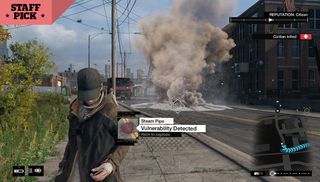2014 Personal Pick — Watch Dogs

Along with our group-selected 2014 Game of the Year Awards, each member of the PC Gamer staff has independently chosen another game to commend as one of the 2014's best.
Admittedly, the story is forgettable, the protagonist is dull, and standard Ubisoft miscues like insta-fail stealth missions and poor checkpointing conjure up plenty of frustrations. But if you grit your teeth through the intermittent downers you'll be rewarded with a beautiful, sprawling sandbox of Chicago and some amazingly fun tools to hack it with. Turning traffic lights and steam pipes into weapons to destroy pursuers (or those you're pursuing) adds an exciting new element to driving and a satisfying alternative to shooting. While on foot, you can use chains of security cameras to infiltrate buildings, engage in 3-D puzzle solving, and sling yourself down the street like an electronic Spider-Man, all while nonchalantly standing on a street corner and peering at your phone. You can even fight bad guys without getting your hands dirty by remotely triggering traps and explosives. Aiden Pearce's smartphone is so much fun to use it more than makes up for the drag of being Aiden Pearce.
The most enjoyable part of the game, though, is its inventive multiplayer, particularly the mode called Online Hacking in which you invade another player's game without them knowing. Follow an unsuspecting player around while trying to blend in with the other NPCs, get close enough to start hacking their phone's data, and then hide and watch as they desperately try to find you among the crowds of innocent NPCs before time runs out.

What makes this mode so interesting is the way the advantage shifts from player to player during a round. Arriving in another player's game, you have long minutes in which to carefully tail them and orchestrate your hack while they remain completely unaware that they're even being watched. Once you start hacking, however, a swiftly shrinking circle is drawn around your location and your opponent will begin to scrutinize every NPC in the vicinity, making it incredibly difficult not to draw attention to yourself. If you're discovered, the advantage kicks back into your court: you need only escape, while your target must both chase you down and kill you.
Knowing someone could be tailing you through your own single-player game at any time provides the theme of paranoia the main story is sadly lacking. Slipping into someone else's game, meanwhile, gives you the voyeuristic enjoyment of watching them unselfconsciously play, as if they're the star of a Twitch channel they don't know is being broadcast. You also get to watch them frantically try to locate you, which is both tense and hilarious. In one match, I hid behind the counter in a gun store. My opponent ran through the store no less than five different times while searching for me but never noticed both the store owner and another NPC were talking to me the entire time I was crouched there.
It's also great fun to detect an infiltrating player before they've even begun hacking you. One time, while speeding through Chicago, I stopped my car and climbed out to begin a side-mission. I suddenly realized I could hear tires screeching, glass breaking, and NPCs screaming in the distance. As I waited, the sounds grew closer and closer until a car suddenly shot from a side street into the middle of the intersection and skidded to a halt. The vehicle was almost entirely destroyed: hood crumpled, doors missing, windows shattered, engine smoking. The driver jumped out, looked around, spotted me staring at him, then jumped back into his shattered, smoking wreck and lurched away. It was the most obvious and inept tail I'd ever seen, but I was too busy laughing to even think about chasing him down.

It's Christmas. Would you like a free game? Of course you would! Thanks to our friends at Playfire, you can get a free Steam key right now. Follow the link for full details.
The biggest gaming news, reviews and hardware deals
Keep up to date with the most important stories and the best deals, as picked by the PC Gamer team.

Chris started playing PC games in the 1980s, started writing about them in the early 2000s, and (finally) started getting paid to write about them in the late 2000s. Following a few years as a regular freelancer, PC Gamer hired him in 2014, probably so he'd stop emailing them asking for more work. Chris has a love-hate relationship with survival games and an unhealthy fascination with the inner lives of NPCs. He's also a fan of offbeat simulation games, mods, and ignoring storylines in RPGs so he can make up his own.
Most Popular


